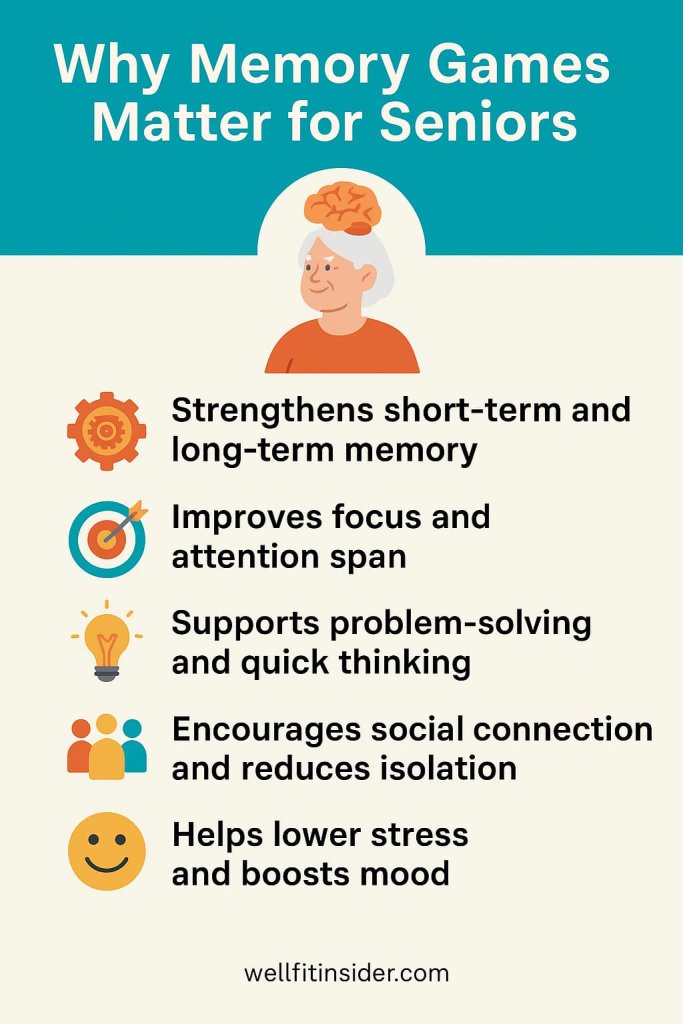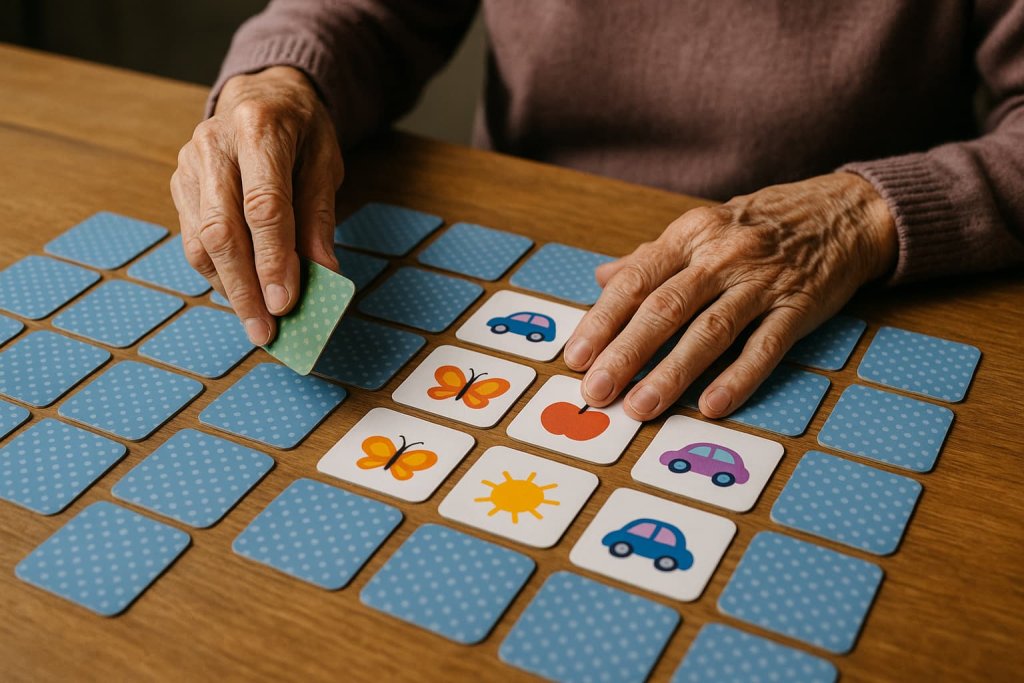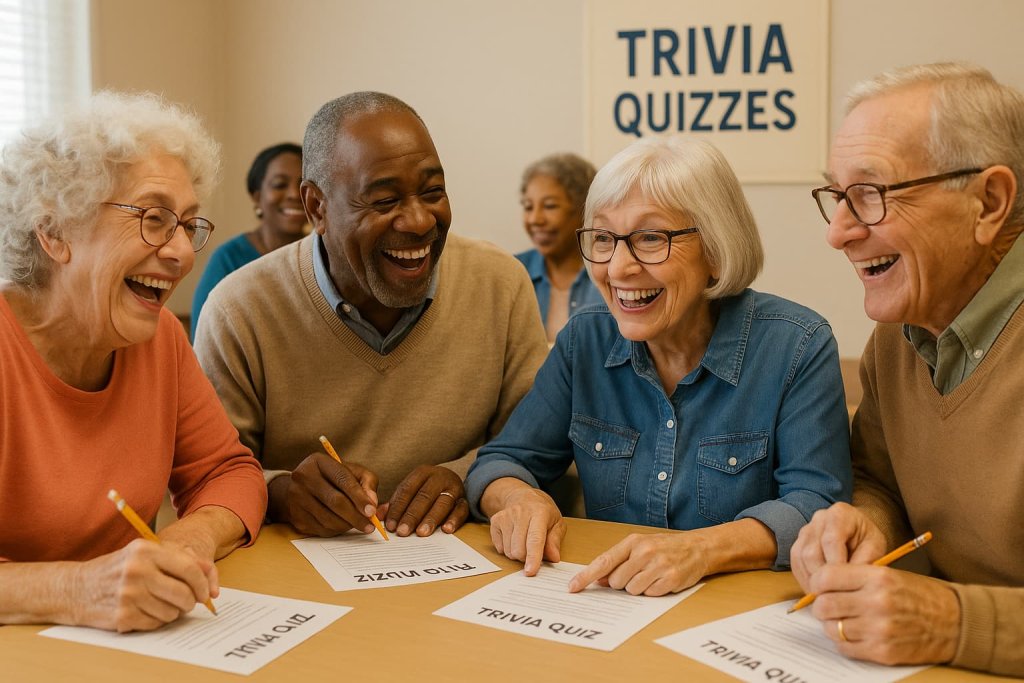Keeping the mind active is just as important as keeping the body strong. Memory games for seniors help sharpen recall, boost focus, and maintain mental agility as we age. They are fun, affordable, and scientifically proven to support brain health when practiced regularly.

As the Alzheimer’s Association notes, engaging in regular mental challenges may reduce the risk of cognitive decline and improve overall quality of life. Whether played online or offline, memory games give seniors a simple way to stay mentally sharp while enjoying themselves.
Why Memory Games Matter for Seniors

As people grow older, natural changes in the brain can affect memory, attention, and processing speed. While occasional forgetfulness is normal, memory training through games provides several key benefits:
- Strengthens short-term and long-term memory
- Improves focus and attention span
- Supports problem-solving and quick thinking
- Encourages social connection and reduces isolation
- Helps lower stress and boosts mood
Research shows that seniors who regularly play mentally stimulating games perform better in cognitive tasks than those who don’t. A 2025 clinical trial published in The Washington Post found that nursing home residents who played board games twice weekly experienced improved comprehension, attention, and memory.
Best Memory Games for Seniors
1. Card-Matching Games (Concentration)

Card-matching games, also known as Concentration or Pairs, are simple but very effective for memory training. Players flip two cards at a time to find a matching pair, which requires remembering where specific cards are placed. These games are excellent for keeping the brain sharp because they rely on short-term recall and visual recognition.
Benefits:
- Strengthens both short-term recall and attention to detail
- Improves visual memory and pattern recognition
- Helps with focus and concentration, especially for seniors who need gentle cognitive workouts
Where to Play: Free versions are available on Memozor and HelpfulGames, which offer different themes and difficulty levels designed for seniors.
2. Crossword & Word Recall Games

Crosswords, Scrabble, and word search puzzles are classic games that never lose their value. They challenge the brain by asking players to recall words, spelling, definitions, and general knowledge. Because language skills naturally decline with age, word games are especially helpful for maintaining sharpness.
Benefits:
- Expands vocabulary and word recall speed
- Improves spelling and cognitive flexibility
- Stimulates multiple areas of the brain involved in language and problem-solving
Where to Play: Seniors can access daily puzzles on AARP Games and Arkadium, both of which are user-friendly and free.
3. Simon Says & Sequence Games
Digital versions of the classic game Simon involve repeating a sequence of lights, sounds, or movements. Each round adds another step, making the sequence progressively harder. These games directly exercise working memory, which often declines first with age.
Benefits:
- Strengthens attention span and concentration
- Improves sequencing skills, important for daily tasks
- Exercises working memory, which is crucial for remembering instructions and conversations
Where to Play: Free apps are widely available on iOS App Store and Google Play Store. Some versions even include sound and color adjustments for seniors with hearing or vision challenges.
4. Jigsaw Puzzles for Memory

Jigsaw puzzles are more than just relaxing entertainment — they actively strengthen memory. To complete a puzzle, seniors must recall colors, shapes, and patterns, and then match them with the right location. This process stimulates both memory and problem-solving skills.
Benefits:
- Enhances visual-spatial memory and pattern recognition
- Improves problem-solving and logical thinking
- Encourages patience and reduces stress by offering a calming activity
Where to Play: Seniors can enjoy free digital puzzles at MindGames.com, or use traditional physical jigsaw puzzles for a more hands-on approach.
5. Trivia Quizzes

Trivia games test long-term memory by asking questions about history, music, sports, movies, and everyday facts. They are particularly fun in group settings and help encourage conversation and social interaction.
Benefits:
- Strengthens long-term recall and knowledge retention
- Encourages learning new facts and keeping the mind engaged
- Provides social enjoyment when played with family, friends, or in senior groups
Where to Play: Free trivia games are available on Arkadium, and many community centers or senior groups host trivia nights that provide both cognitive benefits and social fun.
6. Brain Training Apps
Modern brain training apps combine fun with neuroscience-backed exercises to keep the brain sharp. These apps are particularly useful for seniors because they break memory training into small, daily sessions that are easy to fit into a routine. Many also adapt to a user’s ability level, provide progress tracking, and include a wide variety of mini-games that target memory, focus, reasoning, and problem-solving.
For seniors who want convenient, on-the-go memory exercises, here are some of the best apps:
🧠 Lumosity
One of the most popular brain training platforms, Lumosity offers over 40 games designed to boost memory, speed, and attention. The app adjusts difficulty based on performance and provides detailed progress reports.
Download for iOS: Lumosity on App Store
Download for Android: Lumosity on Google Play
🎯 Elevate
Elevate focuses on memory, processing speed, and communication skills through fun, game-like challenges. It also includes personalized daily training plans.
Download for iOS: Elevate on App Store
Download for Android: Elevate on Google Play
🔑 Peak
Peak offers over 45 brain games across different categories like memory, attention, and problem-solving. The app includes personalized coaching and even a “Senior Mode” that makes it more accessible.
Download for iOS: Peak on App Store
Download for Android: Peak on Google Play
🌐 CogniFit
CogniFit provides cognitive training programs designed by neuroscientists. It includes memory-specific activities and even allows seniors to compare results with others in their age group.
Download for iOS: CogniFit on App Store
Download for Android: CogniFit on Google Play
Benefits of Brain Training Apps for Seniors
- Personalized Training: Adapts to each senior’s skill level.
- Variety of Games: Covers memory, focus, logic, and reasoning.
- Progress Tracking: Charts and weekly reports to measure improvement.
- Flexibility: Can be played anywhere on phone or tablet.
- Motivation: Achievements and reminders encourage consistency.
These apps provide an excellent way for seniors to keep their memory sharp while enjoying fun, interactive challenges. Most offer free versions with daily games, plus premium upgrades for those who want full access.
Offline Memory Game Ideas for Seniors
Not all memory games need to be online. In fact, many simple offline activities can provide just as many benefits while also creating opportunities for bonding with loved ones.
- Memory Lists: Try memorizing and recalling a grocery list, a list of household items, or names of relatives. This strengthens short-term recall.
- Storytelling: Seniors can tell a short story, and others repeat it or add their own details. This not only boosts memory but also encourages creativity and conversation.
- Flashcards: Using pictures, numbers, or words on flashcards helps seniors practice recognition and recall in a structured way.
- Music Memory: Listening to a familiar song and recalling the lyrics or instruments engages both memory and emotional centers of the brain.
👉 These memory games are simple, enjoyable, and scientifically effective. By playing just 15–30 minutes a day, seniors can keep their minds active, improve recall, and gain the confidence that comes from staying sharp and engaged.
Tips for Choosing the Right Memory Games
- Pick games that are enjoyable and not frustrating
- Choose easy-to-use platforms with large text and simple navigation
- Mix digital and offline games for variety
- Involve friends or family to make games more social
- Play consistently—15–30 minutes daily is enough to see benefits
FAQs About Memory Games for Seniors
1. What are the best memory games for seniors?
Card-matching games, crosswords, trivia, jigsaw puzzles, and brain-training apps are some of the best.
2. Do memory games really improve recall in older adults?
Yes. While they don’t cure memory conditions, they strengthen recall, focus, and mental agility.
3. How often should seniors play memory games?
Experts recommend at least 15–30 minutes daily for noticeable improvement.
4. Are free online memory games safe for seniors?
Yes, when played on trusted platforms like AARP Games, Arkadium, or Memozor.
5. Can memory games prevent dementia?
They can’t prevent dementia, but research suggests they may help slow cognitive decline when combined with a healthy lifestyle.
Conclusion
Memory games for seniors are more than just entertainment—they’re a powerful tool for keeping the mind active, sharp, and resilient. From card-matching games to trivia and brain apps, seniors have endless opportunities to strengthen memory while having fun.
👉 Make memory games a part of your daily routine and enjoy the confidence of a sharper mind.
